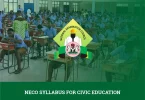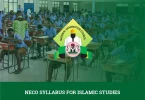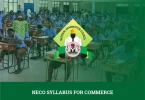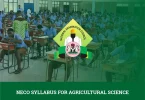The NECO June/July examinations are set to commence soon, and by now, serious candidates who want to excel in the exams are already studying diligently to pass.
We hope you are making use of the syllabus provided by NECO? If not, you really should, because the NECO Syllabus for Igbo outlines the exact topics that will be asked in the examination.
To help you prepare better, we have provided the full NECO syllabus for Igbo Language, the recommended texts, and other important details that we believe will guide you towards passing the paper successfully. Scroll down to get started.
NECO Syllabus For Igbo
Section A: Language (30 Marks)
Comprehension (Aghọtaazaa)
- One passage of approximately 150 words.
- Questions to assess understanding, vocabulary, and interpretation of figurative and idiomatic expressions.
Composition/Letter Writing (Edemede/Edemleta)
Candidates are to write an essay of about 300 words.
Topics may include:-
- Narrative (Akọmakọ)
- Descriptive (Nkọwa)
- Argumentative (Mgbagha)
- Expository (Nkọwa)
- Dialogue (Mkparịtaụka)
- Debate (Mkparịta ụka)
- Letter writing (Edemleta)
Sound System (Ụdaasụsụ)
- Vowels and Consonants (Ụdaume na mgbochiume)
- Syllable structure and classification.
- Sound processes include vowel harmony, assimilation, and elision.
- Tone and tone notation.
Grammar (Asụsụ)
- Spelling rules.
- Word formation.
- Igbo dialects and Standard Igbo.
- Loan words.
- Word classes: Noun, verb, pronoun, conjunction, preposition, etc.
- Grammatical categories: tense, number, person.
- Phrases and clauses: types and functions.
- Sentences: constituents and types, including direct and indirect speech.
- Lexis and structure.
- Punctuation marks.
Section B: Literature (22 Marks)
Oral Literature (Akụkọ Igbo)
- Definition and characteristics.
- Classification and functions.
- Literary devices.
- Folktales (Ifo), Anecdotes (Ụkabụilu), Legends (Nkọkịrịkọ), Myths (Nkọmịrịkọ), Poems (Abụ), Songs (Uri), Proverbs (Ilu), Riddles (Agwụgwa), Chants (Mbem), Oral drama (Ejije ọnụ), Tongue twisters (Okwuntụhi).
Written Literature (Akwụkwọ Ederede)
- Prose, Poetry, Drama.
- Analysis of themes, characters, and settings.
- Appreciation of literary styles and techniques.
Section C: Culture (8 Marks)
Customs (Omenala)
- Language and communication.
- Clothing and adornment.
- Festivals and ceremonies.
- Marriage customs.
- Burial rites.
- Traditional occupations.
Institutions (Ụlọọrụ)
- Traditional leadership structures.
- Age grades and their roles.
- Religious institutions and practices.
- Social organizations.
Recommended Texts
Get the books listed below and commence your preparation for the NECO Igbo examinations.
- Akụkọ ifo Igbo
- Ndị Igbo na ọdịnala ha
Poetry:
- Abụ Igbo
- Uri Igbo
Drama:
- Ejije ọnụ Igbo
- Nkọwa Igbo
Study Tips for NECO Igbo
To do well in the NECO Igbo exam, it’s not just about reading hard—it’s about reading smart. Follow these simple tips:
- Familiarize yourself with the topics outlined in the syllabus to focus your studies effectively.
- Regularly practice writing essays and letters in Igbo to improve your writing skills.
- Pay attention to the Igbo sound system, including tones and pronunciation.
- Strengthen your understanding of Igbo grammar rules and structures.
- Engage with prescribed texts to enhance your appreciation of Igbo literature.
- Study Igbo customs and institutions to understand cultural contexts.
- Practice with past examination questions to familiarize yourself with the exam format.
Found this syllabus helpful? Don’t keep it to yourself, share it with your classmates and study group. If you have any questions, feel free to drop them in the comments section, and we’ll be happy to help. If you are looking for syllabi for other NECO subjects, you can check our page for more.







Leave a Comment